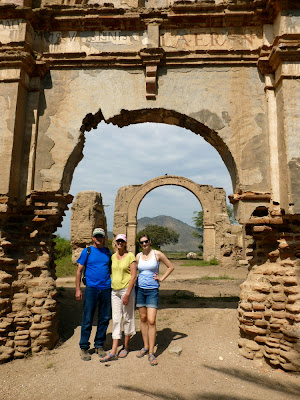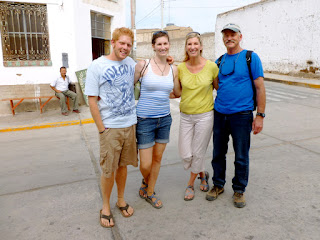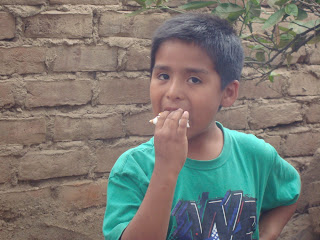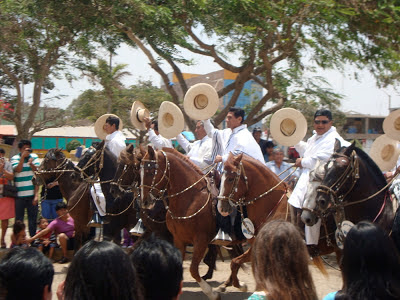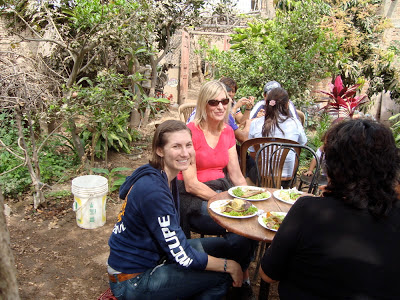Okay people, it’s time you
learned a hard truth;
People think you’re weird.
As you know, part of Peace
Corps isn’t just working in our host community (Goal 1), it is helping them
have a better understanding of US Americans (Goal 2), as well as all of you to
have a better understanding of our host country (Goal 3).
Well, I’ve told you about
the food, the dancing, the music, the traditions, the awkward and
funny (but mostly awkward) situations I’ve found myself in. But, I haven’t
talked much about how people react to me and my culture and the things I tell them about back home. And then there are the
things I haven’t told them at all, but they believe to be 100% true about the
US.
So, I’m going tell you what
Peruvians (at least the ones I’ve interacted with) think about the US; misconceptions, things they find bizarre, troubling, and funny, and things that
fascinate them.
Misconceptions:
Some bizarre things people have told me about my own culture and country.
Everyone in the US is
tall with fair skin and hair, and “light eyes” (meaning anything lighter than dark
brown). If you do not fit that stereotype, you are a recent immigrant from
another country.
Sorry, I don’t help much
with this misconception being as I am tall, white as a ghost, and have hazel
eyes. But if they see a picture of one of my friends with dark skin
and hair they ask, “Is she Spanish?” Or a friend who is black, “Are they from
Africa?” It doesn’t matter that my friends might have ancestors that were some
of the first to colonize the US-- if they aren’t typical “gringo” they must be
recent immigrants, or first generation.
 |
| Nicole, Zack, and I perpetuating stereotypes in our region. |
All African Americans are
either pro-athletes, rappers, or gangsters.
That is how
the majority of African Americans are portrayed in the media.
Everyone in the US has a
fridge stocked with beer, all the time.
Thanks a lot, TV.
US Americans eat all of
their food out of cans and cardboard boxes.
A little bit of generalizing
here, as I know many people who have their own gardens and make a practice of
trying to eat fresh foods often. However, in comparison to here, we do eat a lot of dry and canned goods.
US Americans eat a lot of
fast food.
Oh, wait, I was talking
about misconceptions wasn’t I? J/k. Obviously the same applies for this one as
above, but in comparison to here, yes, we do.
Everyone has been to, or
lives near, Houston, New York, New Jersey, and Miami.
Geography isn’t a strong
point here. It’s hard for them to imagine just how big the US is, but many of
them have distant cousins or relatives who have moved to the aforementioned
cities.
The US is cold, and
almost always covered in snow.
You could say, we’re like
Winterfell or “Beyond the Wall” to some Peruvians (sorry, Game of Thrones
reference). Many Peruvians have never seen snow in their life, except for on TV
where every Christmas movie has towns covered in snow. Meanwhile, Christmas
here is the beginning of summer. We just have more seasons in some states of
the US than here. But my home state of Idaho could almost fit that myth.
 |
| Standing next to the road to Boundary Creek, where I used to work for the Forest Service. This picture was taken mid-May before joining Peace Corps. |
Oddities:
Here’s some info I’ve either
passed along which has received a bit of criticism, or things they have heard
that they find bizarre.
US Americans don’t often
live in the same community as their immediate or extended family.
While it is becoming more
common for Peruvian family members to move to different areas for work
opportunities, families mostly stay in one community for generations. Everyone
is surprised to hear how my brothers live in three separate states and over a
day’s worth of travel in distance from one another.
We go on runs for
exercise.
What are you running from?
We have no regard for the
temperature of our beverages
Cold drinks make you sick.
Period.
Lunches are small, often
cold, and even sometimes skipped.
Lunch is a big deal here.
Everyday lunch is a three-course meal with soup as a starter. A “cold lunch”
just doesn’t even sound like a meal to them.
There are homeless people
in the US.
Most Peruvians know about
the economic crisis that our country is in, but we are still very wealthy in
comparison. It is bizarre to them that anyone could live on the streets while
living in the US.
We care about age and
weight, and what people say about it.
Take this conversation I
overheard between my host parents and host sister during dinner:
Host sister: Today my friend
Lizbeth asked me how old you guys were and I said, “I dunno, I think 54 and 62.
They’re old.”
Host mom: I’m 49 and your
father is 52.
HS: Oh, really? You guys
look so old, especially dad.
Meanwhile I am listening to
this with my mouth gaping open, eyes darting between all three of them waiting
for the insult to sink in. And I waited. And my host parents didn’t even bat an
eye. My host dad didn't even stop eating to comment.
Finally I said, “That would’ve
been considered incredibly offensive in the US. You never tell someone they
look old. Same goes for telling someone they're fat.”
“Really?” they said,
interested. “Strange.”
Women forsake their
family’s name when they marry.
In Latin culture it is
common for everyone to have two last names—the mother’s last name and the
father’s last name. They find it very strange that a common marriage tradition
in the US is for a woman to change her last name to that of her husband's. To
them it is forsaking your family name, and also letting your children forsake
it as well. Why does everyone have to have the same last name as the husband?
My host dad once told me, “When
you get married, don’t change your last name. Your husband can always leave
you, but your family never will.”
We don’t all have a quinceañera
(or other large traditional celebrations).
While I have Mexican friends
who celebrated their 15th birthday with a traditional quinceañera,
it isn’t a common celebration in the US as a whole. “Sweet 16” comes nowhere
close to the festivities for a quinceañera.
We don’t celebrate the
dead.
Every year on the birthday
or anniversary of the death of a family member, that person is remembered and
celebrated. This continues for decades. Twice I have spent the afternoon in the
cemetery eating and drinking with my host family while they sang, shared
stories, and sat in prayer next to the tomb of my deceased host-grandfather.
The whole day is taken off by all of the family members so that they can
attend, and the celebration is moved from the cemetery to a family member’s
house. At first it felt a little strange, but I’ve come to look forward to
these celebrations. Even years after his death, the gatherings are filled with
tears and laughter.
We have so much, yet we
are so unhappy.
Clearly, screwed up stuff
happens everywhere. Peruvians are by no means saying we as a society are more
screwed up than they are. But one thing that some Peruvians can’t wrap their
heads around is how unhappy we are as a society. We have some of the best
technology in the world, access to clean water and food, decent public
education, more materialistic goods than we know what to do with, and yet all
they hear about us on the news is how we’re on anti-depressants, constantly at
war, have high suicide rates (we rank 38 out of 107 countries—Peru 95),
committing hate crimes against people of different races and religions, and
people are busting into schools, churches, businesses, and movie theaters and
shooting off a couple rounds into crowds of innocent people.
It’s a complicated subject
to breach, but I’ll say that just because Peru is a 3rd world
country doesn’t mean they are unhappy. But they sure wonder why the country in
world power is.
We don’t eat guinea pigs.
They just laugh and laugh
and laugh when I tell them guinea pigs are cherished pets in the US.
It goes both ways
Misconceptions and
misunderstandings abound when it comes to inter-cultural exchange, especially
when people have had limited exposure to that culture before. How many of you
thought that because I’m in South America I eat spicy food, people drive
low-riders, and everyone is dreaming of crossing the border into the US? On the
other hand, I can’t even begin to tell you how many Peruvians have assumed I
own a smart phone, lived in New York, and personally know Justin Bieber.
Trying to iron out misconceptions and give people a better idea of the US is all part of the job.
Some days, with how many roadblocks prevent me from working, it is the only part
of my job I can say I’ve done for the day. So, I’m trying my best down here. I only hope I’m somewhat helping on the other end and giving you a
better understanding of my part of Peru. Because even when I joke around, or am
frustrated with certain aspects of the culture, I love it here. There is so
much about Peru I could never convey. Peru is a beautiful place I have come to
care about very much, and I will never forget the kindness and acceptance the
people here have shown me. Yeah, Peruvians think you’re weird, but they also
think you’re lucky and are fascinated by you. It's a hard job, being the only white girl in town and the first US American many of them have ever met and been friends with. I’m trying to be an “ambassador”
of our country and let them see that while I'm American, I am not everything they think our country is. At the same time, I'm trying to tell all of you back home about a country and culture that has taken me in as family and a friend and hope that I can come even close to giving a proper portrayal.
So friends and family, laugh at yourself a little. People think you do crazy stuff, and you kinda do.









